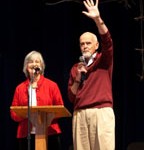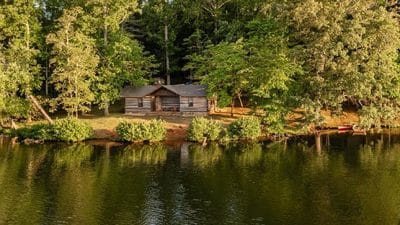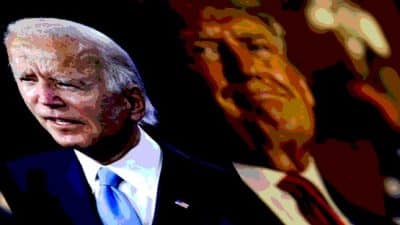
I don’t embrace too well most change that comes my way. I like things to purr along on a steady course, with surprises that pop up being of the pleasurable variety. Particularly difficult for me are the rapid technological changes that force me to adapt in my workplace, many serving to increase the workload and heighten expectations for fast turnaround on requests and projects. Greater productivity, hey, that’s grand, but higher stress levels I can do without.
Then, amid my repeated cries to “slow down a bit, will ya?” a couple appears on campus, a literal balm in Gilead. Tom and Christine Sine of Seattle, Wash., spoke in a variety of settings on change, calling their audience to join a “conspiracy,” a counter-cultural revolution, to go against the grain of what the larger society deems “success.”
Some may have deemed them wild-eyed radicals, but they were hardly issuing a call for anarchy – unless one trembles at the thought of change that likely requires a reexamination and reordering of life’s priorities.
It was a message that I should have heard several decades earlier – and maybe I did, but wasn’t interested in listening to at the time.
The Sines are part of a small, intentional community in Seattle called The Mustard Seed Associates. They have spent years doing research, writing and speaking to a broad range of audiences, using the metaphor of a mustard seed similar to the parable that Christ used (Mark 4 and other passages) to illustrate what the Kingdom of God is like – or has the potential to become.
The Sines’ message was simple, yet profound: “We are like grains of mustard seed, one of the smallest of all the seeds on earth, but when planted in good soil it grows up to become larger than all the garden plants.
“We’re allowing the larger culture and a high-powered global economy to define our lives for us,” Tom Sine said. “Rather, we should be finding our own focus and creating the future one mustard seed at a time rather than allowing others to do it for us.”
“These are incredibly difficult days we’re living in,” Tom Sine said. “But what tremendous opportunities we have to work at imagining some new forms and ways of doing church, of becoming change agents in our communities through loving acts of servant leadership.”
They encouraged persons to draft a “statement of calling,” identifying one specific, probable way that God might use their lives to advance God’s program in these turbulent times. Unleash your imagination, pray fervently, talk to pastors and counselors and other leadership people as you work at discernment, they advised.
The Sines addressed an audience largely made up of young adults, those just now starting to wrestle with these critical, life-changing questions. But, they made me realize how easy it is to presume that their message has little relevance for one some 40-plus years further down life’s highway than the current student body.
I’d like to believe that while I’ve been sowing and hoeing in the same journalistic field for some 43 years that my mustard seed hasn’t all shriveled up, that there’s still a spark of imagination burning in this curmudgeon’s cranium, that I still have a few things to offer that can indeed help make a difference in our confused and fragmented society, locally and even beyond – if I’m willing to seek counsel, walk circumspectly and work at creating the future rather than letting it shape and control me.
A declaration by Quaker minister Stephen Grellet (1773-1855) still rings true these many years later:
“I expect to pass through this world but once. Any good thing, therefore, that I can do or any kindness I can show to any fellow human being let me do it now. Let me not defer nor neglect it, for I shall not pass this way again.”
Hmmmm, now where’s that packet of mustard seed?
– Column by Jim Bishop










